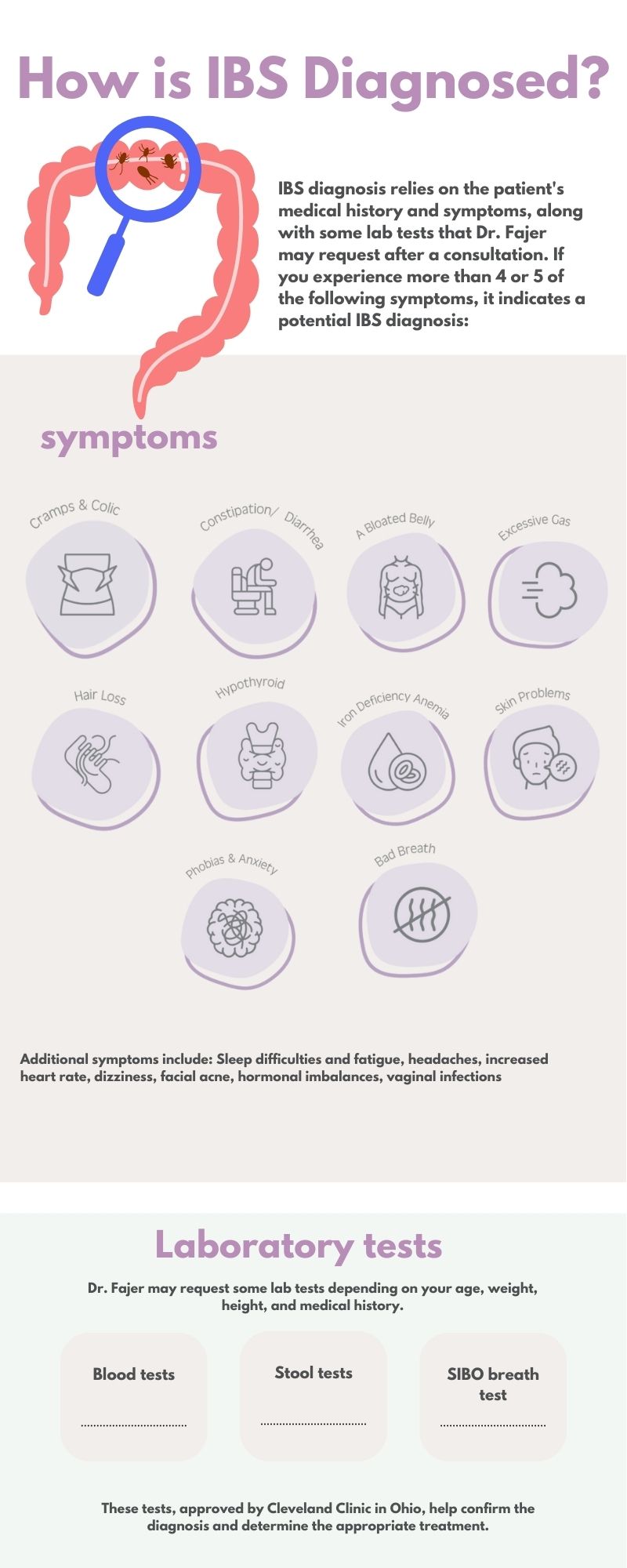Blog
Irritable Bowel Syndrome Natural Treatments
Irritable Bowel Syndrome (IBS) is a very common condition in our current era, causing significant discomfort due to its distressing symptoms. This condition affects the quality of life, impacting personal relationships, work, and studies. Unfortunately, many doctors diagnose IBS as a psychological disorder and prescribe psychiatric medication for its treatment. While psychological conditions can exacerbate IBS symptoms, the syndrome is actually a symptom of numerous underlying conditions, most notably SIBO (Small Intestinal Bacterial Overgrowth), food sensitivities, stomach acid deficiency, and many other causes that will be discussed in this article.
What are the Symptoms of IBS?
IBS is a term used to describe a type of digestive disorder characterized by a set of common symptoms that usually appear after eating. Symptoms vary greatly from person to person and tend to come and go with stress and other lifestyle changes. For some, several IBS symptoms may occur together in “clusters,” while for others, one or two symptoms might be the most prominent, such as bloating, diarrhea, or constipation. Common IBS symptoms include:
- Diarrhea and/or constipation.
- Abdominal pain, aches, and cramps.
- Severe gas and belching.
- Poor digestion and feeling of fullness.
- Heartburn and acid reflux.
- White coating on the tongue.
- Bad breath.
Additionally, some symptoms associated with IBS appear outside the digestive system due to leaky gut syndrome, such as:
- Anxiety, depression, and panic attacks.
- Sleep difficulties and fatigue.
- Headaches.
- Increased heart rate.
- Hypothyroidism.
- Hair loss.
- Anemia/iron deficiency.
- Skin problems like psoriasis.
- Dizziness.
- Facial acne.
- Hormonal imbalances.
- Vaginal infections.
What are the Root Causes of IBS?
Researchers believe that IBS results from a complex interplay of factors, with major causes being an imbalance in the beneficial bacteria communities, nerve and enzyme disturbances, and muscle issues in the digestive system, affecting nutrient absorption and fluid and gas secretion, which in turn lead to the variety of symptoms.

Despite the varied causes for each individual, some common root causes contributing to IBS and its symptoms include:
- SIBO (Small Intestinal Bacterial Overgrowth): One of the common root causes of IBS, SIBO involves an imbalance in the bacterial environment of the digestive system, leading to excessive growth of bacteria in the small intestine and causing unpleasant symptoms like gas and bloating due to bacterial fermentation of food.
- Difference Between SIBO and SIFO: SIBO refers to the overgrowth of harmful bacteria in the small intestine, while SIFO (Small Intestinal Fungal Overgrowth) is the overgrowth of fungi in the digestive system. Several studies and Dr. Fajer’s experiences indicate that both often occur together.
- Food Sensitivities: People with IBS are more prone to sensitivities to certain foods like gluten, dairy products, sugar, corn, soy products, peanuts, hydrogenated fats, and ready-made sauces. These sensitivities can lead to digestive inflammation and damage the cells responsible for producing digestive enzymes. Some food sensitivities can be genetic, such as lactose and gluten intolerance, but they are often acquired due to unhealthy lifestyles. The good news is that acquired sensitivities can be treated through the SIBO recovery and gut rebuilding program. Through this program, a person can eventually consume dairy and gluten in a smart and moderate way.
- Deficiency in Stomach Acid and Digestive Enzymes: A deficiency in stomach acid (hydrochloric acid) and certain digestive enzymes can impair protein digestion and cause digestive issues like gas and constipation or diarrhea.
- Growth of Parasites and Worms in the Digestive System: Some cases are associated with the growth of parasites and worms in the digestive system, complicating IBS and causing various symptoms.
- Crohn’s Disease or Inflammatory Bowel Disease: Crohn’s disease and inflammatory bowel disease can contribute to IBS symptoms, causing inflammation and disturbances in the digestive system.

Natural Treatment Methods for IBS
IBS symptoms can be identified and treated naturally through lifestyle changes and a nutritional treatment plan. Recovery can be achieved within two to three months by following a proper diet and avoiding triggers.
The primary goal in treating IBS includes the following four stages:
- Elimination Stage: Avoid foods that trigger IBS symptoms and cause inflammation and allergies, such as gluten, sugar, dairy, eggs, peanuts, and spicy foods, for two to three months for complete healing. Replace unhealthy hydrogenated oils with healthy oils like olive oil and avoid canned and packaged foods. Use organic coconut oil daily to help kill harmful bacteria, as it is considered one of the most important natural antibiotics.

- Enhancing Digestion or Compensation Stage: Enhance stomach acids and digestive enzymes by consuming apple cider vinegar or digestive enzyme capsules to compensate for enzyme deficiency common in IBS sufferers and improve the digestive system’s ability to absorb proteins and nutrients from food effectively.
- Killing Harmful Bacteria: Most people with IBS also suffer from SIBO (bacterial overgrowth) or SIFO (fungal overgrowth). To achieve recovery, harmful bacteria and fungi must be killed using anti-inflammatory superfoods and natural antibiotics prescribed by Dr. Fajer based on your consultation and test results.
- Repair Stage (Gut Rebuilding): The goal in this stage is to enhance the digestive system membranes due to chronic inflammation and repair the gut. This can be achieved by consuming bone broth, which contains collagen, and taking natural omega-3 sources or daily capsules.
- Restoring Beneficial Bacteria Stage: Enhance beneficial bacteria and restore the balance of microorganisms in the digestive system by consuming fermented foods or probiotic capsules.
Do not forget the importance of maintaining a healthy lifestyle, including adequate night sleep, exercise, engaging in favorite hobbies, meditation, and healthy eating focusing on anti-inflammatory foods like garlic and turmeric.
Important Note: If you suffer from SIBO, it is crucial not to consume fermented foods and probiotic supplements at the beginning of the treatment protocol and to wait until after the fourth week to start taking them.
Conclusion
Dr. Fajer Aljumairi has helped thousands of people recover from IBS and SIBO and rebuild their guts through her specialized programs. These programs rely on lifestyle changes, providing a customized diet for participants, along with superfoods and dietary supplements. Thanks to these steps, many people have been able to get rid of these unwanted health issues.
For more information on how to enroll in the SIBO recovery and gut rebuilding program, and to read the experiences and testimonials of thousands of participants from around the world who have successfully overcome IBS and SIBO after following this program for just two months, visit this link: https://drfajeraljumairi.com/ar/digestive-health/ibs-sibo-program/
To learn more about irritable bowel syndrome natural treatments, please refer to Dr. Fajer Aljumairi YouTube channel and watch this episode:

